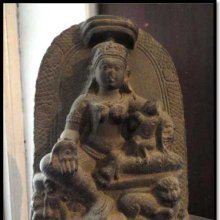Prabhankara, Prabhaṅkara, Prabhaṅkarā: 3 definitions
Introduction:
Prabhankara means something in Buddhism, Pali, Jainism, Prakrit, Hinduism, Sanskrit. If you want to know the exact meaning, history, etymology or English translation of this term then check out the descriptions on this page. Add your comment or reference to a book if you want to contribute to this summary article.
Images (photo gallery)
In Buddhism
Mahayana (major branch of Buddhism)
Source: Wisdom Library: LokottaravādaPrabhaṅkara (प्रभङ्कर) or Prabhaṃkara is the name of a Buddha under whom Śākyamuni (or Gautama, ‘the historical Buddha’) acquired merit along the first through nine bhūmis, according to the Mahāvastu. There are in total ten bhūmis representing the ten stages of the Bodhisattva’s path towards enlightenment. His name can also be spelled as Prabhaṃkara (प्रभंकर).
Prabhaṅkara is but one among the 500 Buddhas enumerated in the Mahāvastu during a conversation between Mahākātyāyana and Mahākāśyapa, both principle disciples of Gautama Buddha. The Mahāvastu is an important text of the Lokottaravāda school of buddhism, dating from the 2nd century BCE.

Mahayana (महायान, mahāyāna) is a major branch of Buddhism focusing on the path of a Bodhisattva (spiritual aspirants/ enlightened beings). Extant literature is vast and primarely composed in the Sanskrit language. There are many sūtras of which some of the earliest are the various Prajñāpāramitā sūtras.
In Jainism
General definition (in Jainism)
Source: archive.org: Trisastisalakapurusacaritra1) Prabhaṅkarā (प्रभङ्करा) is the name of an ancient city, according to chapter 4.1 [śreyāṃsanātha-caritra] of Hemacandra’s 11th century Triṣaṣṭiśalākāpuruṣacaritra: an ancient Sanskrit epic poem narrating the history and legends of sixty-three illustrious persons in Jainism.
Accordingly, as minister Sumati said to king Jvalanajaṭin “[... ] on this mountain there is a city Prabhaṅkarā, the sole abode of many wonders, which has reached the first place in the necklace of the north row. Its king is named Meghavana, possessing the power of Maghavan, fruitful like a cloud at dawn. He has a wife, Meghamālinī, like a wreath of jasmine with the fragrance of good conduct. They have a son, Vidyutprabha, by whom all kings are surpassed, with unrivaled beauty like Kandarpa. [...]”
2) Prabhaṅkarā (प्रभङ्करा) is the wife of Datta (son of Śrīdattā and Dharmamitra from Vindhyapura), according to chapter 5.3 [śāntinātha-caritra].—Accordingly, as king Vajrāyudha said to the Vidyādhara Pavanavega:—“[...] Vindhyadatta was king in the city Vindhyapura in Airāvata in this same Jambūdvīpa. He had a son, Nalinaketu, with all the male auspicious marks, by his wife, Sulakṣaṇā. In that same city there was the crest-jewel of traders, Dharmamitra, like the sun to the lotuses of friends. His wife, Śrīdattā, bore a son, Datta; and Datta had a wife, Prabhaṅkarā, of divine form. [...]”.

Jainism is an Indian religion of Dharma whose doctrine revolves around harmlessness (ahimsa) towards every living being. The two major branches (Digambara and Svetambara) of Jainism stimulate self-control (or, shramana, ‘self-reliance’) and spiritual development through a path of peace for the soul to progess to the ultimate goal.
Languages of India and abroad
Sanskrit dictionary
Source: DDSA: Paia-sadda-mahannavo; a comprehensive Prakrit Hindi dictionary (S)Prabhaṅkara (प्रभङ्कर) in the Sanskrit language is related to the Prakrit words: Pabhaṃkaraṃ, Pabhaṃkara, Pabhaṃkarā.
Sanskrit, also spelled संस्कृतम् (saṃskṛtam), is an ancient language of India commonly seen as the grandmother of the Indo-European language family (even English!). Closely allied with Prakrit and Pali, Sanskrit is more exhaustive in both grammar and terms and has the most extensive collection of literature in the world, greatly surpassing its sister-languages Greek and Latin.
See also (Relevant definitions)
Starts with: Prabhankaravati.
Full-text: Pabhankara, Pabhamkaram, Meghavana, Prabhamkara, Jyotirmala, Dharmamitra, Vindhyadatta, Nalinaketu, Sulakshana, Meghamalini, Sumana, Datta, Shridatta, Vidyutprabha, Suvrata.
Relevant text
Search found 5 books and stories containing Prabhankara, Prabhaṅkara, Prabhaṅkarā; (plurals include: Prabhankaras, Prabhaṅkaras, Prabhaṅkarās). You can also click to the full overview containing English textual excerpts. Below are direct links for the most relevant articles:
Trishashti Shalaka Purusha Caritra (by Helen M. Johnson)
Part 6: Previous births of Śāntimatī and Ajitasena < [Chapter III - Eighth incarnation as Vajrāyudha]
Part 20: Rivalry for Svayamprabhā < [Chapter I - Śreyāṃsanāthacaritra]
Bhagavati-sutra (Viyaha-pannatti) (by K. C. Lalwani)
Part 4 - Famity of Jyotiṣendra and others < [Chapter 5]
Part 3 - Lokāntika devas < [Chapter 5]
Jain Remains of Ancient Bengal (by Shubha Majumder)
Śāsanadevīs or Yakṣiṇīs from Ancient Bengal < [Chapter 6 - Iconographic Study of Jaina Sculptural Remains]
Chapter 7 - Summary and Observations
Caubisi type of Ṛṣabhanātha sculptures < [Chapter 6 - Iconographic Study of Jaina Sculptural Remains]
Mahabharata (English) (by Kisari Mohan Ganguli)
Section CCLXIII < [Draupadi-harana Parva]
The Mahavastu (great story) (by J. J. Jones)
Chapter XXI - Former Buddhas < [Volume III]
